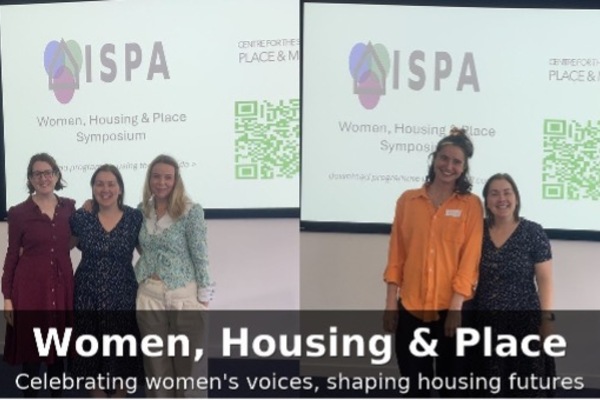
In this blog, Amy Beckett (University of Sheffield/Joseph Rowntree Foundation) reflects on key discussions at the JRF and CIH event ‘Making the private rented sector work for people in poverty’. The event was held on 11th July 2017 at 15 Hatfields, London.
The rapid expansion of the private rented sector (PRS) in recent years has seen the sector rise to become the second largest in the UK after homeownership. The relative flexibility of the sector can provide attractive and diverse opportunities for renters. However, the rapid growth and fragmented nature of the PRS can also present challenges for housing professionals and landlords, and for tenants trying to navigate the market. The sector is also evolving. Where the PRS was once predominantly a short-term, transitional housing option, the sector is becoming a tenure for life for an increasing number of households. The PRS is also now home to 4.7 million people living in poverty and it is these people who often most acutely feel the brunt of problems in the sector such as rent increases, instability and poor-quality accommodation. These issues formed the basis of a one-day conference in London – ‘Making the private rented sector work for people in poverty’ hosted by the Joseph Rowntree Foundation (JRF) in partnership with the Chartered Institute of Housing (CIH).
Campbell Robb, the JRF’s Chief Executive, opened the event. He identified the issues of quality, affordability and stability as the three central challenges facing those in poverty in the PRS (recurring themes throughout the day) and urged that diverse perspectives and voices are needed if the problems in the sector are to be effectively tackled.
The first panel session, brought together a range of perspectives relating to the role of the PRS in housing people in poverty. Karen Croucher from the University of York’s Centre for Housing Policy (CHP) reported on a longitudinal panel study (conducted with the JRF and housing consultants, Altair) tracking the housing and life experiences of more than 70 low-income families across a two to three year period. Croucher used the voices of PRS tenants from the study to illuminate the feelings of precariousness and uncertainty which often impact on those living in the sector. Concerns about affordability and rent increases, fear of ‘rocking the boat’ by reporting complaints, and difficulties in feeling ‘settled’ in a privately rented property without any long-term security were all reflected in quotes from the study’s participants. The presentation highlighted the lack of agency felt amongst some PRS tenants, particularly those living in poverty, and stressed the positive role that good relationships between landlords and tenants can have in alleviating tenant anxieties.
Kate Faulkner, property commentator and analyst argued that landlords are often unfairly characterised in the media, and reminded delegates the majority of landlords only own one property, with many being ‘accidental landlords’ and 15% of landlords themselves residing in the sector. She pointed to a context of growing financial pressures and insecurity experienced by PRS landlords, arguing that this context threatens to push landlords towards withdrawal from the sector. While landlords may wish to provide affordable accommodation to those in poverty and on low incomes, Faulker argued, these opportunities are becoming increasingly financially unviable as a result of welfare reforms and the regulatory environment.
The third panel speaker, Abigail Davies (Assistant Director, Housing consultancy, Savills) explored the role of Local Housing Allowance (LHA) freezes on widening the gap between rents and incomes, drawing attention to the variation in LHA coverage across property sizes and Broad Rental Market Areas (BRMAs). The presentation showed that LHA rates now only cover 100% of the 30th percentile of rents (in at least one property type) in 37 out to 152 BRMAs. In only one BRMA did LHA rates provide 100% (of 30th percentile) coverage across property types and sizes. There was consensus following the presentation amongst the panel and audience that growing disparity between LHA allowances and rents had substantially contributed to issues of affordability in the sector – especially for those in receipt of benefits and those living in areas of high demand.
The JRF’s Mike Hawking later chaired a workshop exploring the role of social lettings agents and their potential to change the sector. The session featured presentations from Susan Aktemal (CEO of Homes for Good), Chris Hancock (Head of Housing at Crisis), Carla Keegan (Director at the Ethical Lettings Agency) and Tony Stacey (Chief Executive of the South Yorkshire Housing Association), and considered the potential of social lettings agencies to provide a fairer service to both tenants and landlords. The panel shared a range of insights into the processes and challenges involved in founding and running a social lettings agency, as well as the need for resilience and determination on the part of those wishing to create change in the sector.
A keynote address from Sir Robin Wales, the elected mayor of Newham, focused on the role that local government can play in improving the PRS. Arguing that the duty of local government is to be ‘interventionist, active and muscular’, Wales outlined the success of Newham’s landlord licencing scheme which aims to provide a direct challenge to unscrupulous landlords and is supported by strict enforcement measures. Wales also discussed plans to encourage housebuilding in Newham and to invest in research to drive future policy.
A second keynote speech, by Jane Everton from the Department for Communities and Local Government (DCLG) provided a central government perspective on the most pressing issues facing the PRS. The government’s 2017 housing white paper demonstrated a growing interest in the sector and Everton highlighted opportunities to tackle issues of affordability and security in the sector and plans to strengthen action against rogue landlords and agents. She also drew attention to the proposed Tenant Fees Bill which was announced in the Queen’s speech, and the pressing need to re-evaluate quality issues across housing tenures following the tragic events at Grenfell Tower in June.
The final panel discussion, chaired by Terrie Alafat, from the Chartered Institute of Housing, considered where to go next in dealing with issues in the PRS. The panel, which included Brian Robson (JRF Policy and Research Manager), John Bibby (Shelter), Julie Rugg (Centre for Housing Policy, University of York) and Richard Lambert (Chief Executive, National Landlords Association) echoed Campbell Robb’s opening emphasis on issues of quality, affordability and stability. The panel agreed that lifting the LHA freeze must be a short-term priority in order to address the shortfall impacting so significantly on those in receipt of Housing Benefit. In the medium term, as Robson noted, there is a role for social letting agencies in creating a fairer lettings system, and for local government and city regions to look towards tackling issues more locally. In the longer term, there is a need for more joined up-working across government and agencies in order to tackle the issues facing the PRS, including a long-term plan for building more homes.
The event highlighted that now more than ever there is a need for innovation in the sector. Robust academic research and analysis has an important role to play in underpinning policy and helping to drive positive future change in the PRS.
Amy Beckett
PhD student, Department of Urban Studies and Planning, University of Sheffield / Policy and Research Intern at JRF






